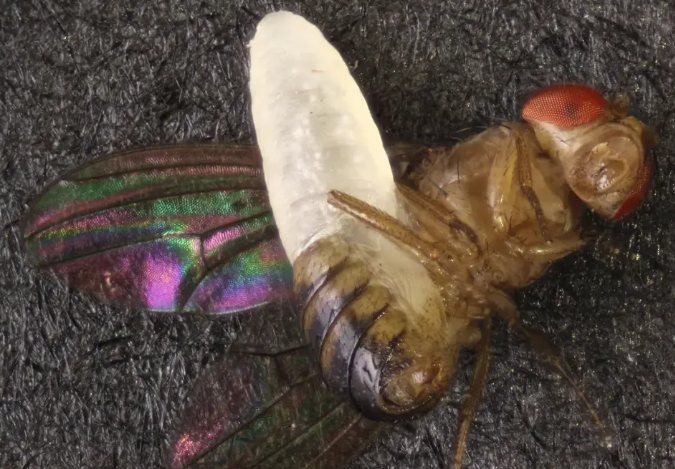Scientists have stumbled upon a previously unknown species of parasitic wasp that infects adult fruit flies and emerges from their stomachs, much like a xenomorph from the Alien movies.
The team of researchers, led by Mississippi State University biologist Logan Moore, made this discovery while collecting fruit flies in their backyards. The newly named parasitic wasp, S. perlmani, is the first of its kind to target adult fruit flies. Other known wasp species only parasitize fruit flies during their earlier larval and pupal stages.
S. perlmani uses a needle-like ovipositor to inject an egg into a fruit fly’s abdomen. The egg hatches into a wasp larva, which grows inside the fly for 18 days before bursting out, killing the host.
“It will effectively emerge out of the side of the fly,” Moore told Live Science, adding, “And just to add an additional layer of horror, the fly will normally remain alive for several hours after that.”
The researchers published their findings in the journal Nature. DNA analysis revealed that S. perlmani is present across the eastern United States, including Mississippi, Alabama, and North Carolina.
Initially, the researchers believed their discovery was a fluke. “At the time we didn’t think it was real,” Moore said. “If you dissect thousands of flies, you will see some things that are strange and odd, and you’ll never see them again.”

(image credit Matthew Ballinger)
The team was actually searching for parasitic worms called nematodes when they made the discovery. They noticed spiky-tailed wasp larvae in the abdomens of some of the fruit flies.
After collecting and observing these infected flies, the researchers discovered that the wasp larvae matured and emerged from their hosts. The wasps then entered a cocoon stage before emerging as adults.
To determine which species of fruit flies S. perlmani could infect, the researchers paired adult wasps with various Drosophila species. They found that the wasps could parasitize Drosophila affinis, Drosophila acutilabella, and even Drosophila melanogaster, a widely studied insect.
The discovery of S. perlmani raises questions about why this parasite has gone unnoticed for so long, considering the extensive research on fruit flies. Moore suggested that the unexpected nature of the parasite’s behavior may have contributed to its remaining undiscovered.
Scientists still have much to learn about this newly discovered parasitic wasp. Its existence highlights the diversity and complexity of the natural world, even within well-studied organisms like fruit flies.
